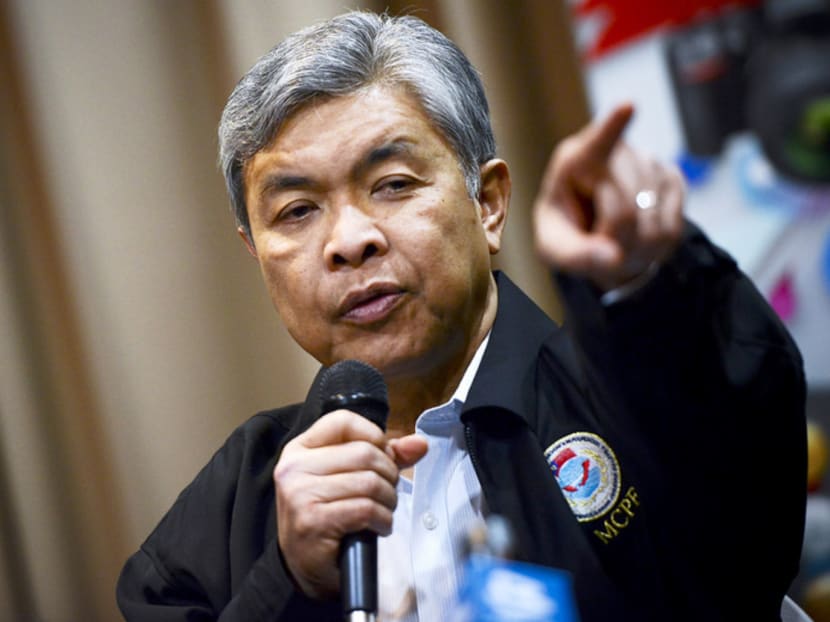KL seeks sweeping new anti-terror laws
KUALA LUMPUR — Barely three years after it abolished its Internal Security Act (ISA) in a pre-election gambit, the Malaysian government yesterday tabled two new Bills in Parliament, as it seeks sweeping powers to deal with domestic terrorism and the worrying trend of its citizens travelling abroad for terror activities.

Mr Zahid said the Bill was formulated as Malaysia had the potential to become a second transit point of foreign terrorists before moving to a third country. Photo: The Malaysian Insider
KUALA LUMPUR — Barely three years after it abolished its Internal Security Act (ISA) in a pre-election gambit, the Malaysian government yesterday tabled two new Bills in Parliament, as it seeks sweeping powers to deal with domestic terrorism and the worrying trend of its citizens travelling abroad for terror activities.
One of the new Bills tabled allows authorities to detain a person involved in terrorist acts for up to two years without trial. The detention can be extended indefinitely by a special board comprising three to six members appointed by the Malaysian King.
The Prevention of Terrorism Bill 2015 (POTA) also does not allow for any judicial review in any court. The only exception is with regard to any question on compliance with any procedural requirements.
The second new Bill — Special Measures Against Terrorism in Foreign Countries Bill — allows for passports and travel documents to be revoked to prevent a person from travelling to a foreign country to engage in terrorist acts.
The authorities can also seize foreign travel documents to prevent suspects from going to a foreign country to engage in or support any terrorist acts.
Home Minister Ahmad Zahid Hamidi was recently quoted as saying by national news agency Bernama that the Bill was meant to curb the entry of foreign terrorists into the country “and was formulated seeing our country has the potential to become a second transit point of foreign terrorists before moving to a third country”.
Mr Zahid tabled the two new Bills for first reading in Parliament yesterday, together with proposed amendments to five Bills related to law enforcement.
The new Bills build on Prime Minister Najib Razak’s proposals last November that a new law against militancy and terrorism be enacted to tackle the dangers posed by Malaysians returning after fighting with the Islamic State in Iraq or Syria or with other similar militant groups.
Government officials recently reported that 100 Malaysians had been arrested by the police on suspicion of involvement with militant groups. The figure did not include 61 Malaysians who have been detected in Syria and Iraq, and 10 who have been killed.
POTA immediately ran into criticisms by members of the opposition Pakatan Rakyat yesterday, with several lawmakers dismissing it as a repackaging of the abolished ISA.
“After a cursory reading, I find that this is no different from the ISA,” said Mr Wong Chen, a Member of Parliament from Parti Keadilan Rakyat. “Like old wine in new bottle.”
The ISA was first introduced in 1960 to counter the communist insurgency and was repealed and replaced in 2012 by the Security Offences (Special Measures) Act, which deals broadly with national security and public safety.
In a speech last week, Mr Najib gave his assurance that POTA would not be used for political purposes.
Mr Najib added that the executive arm of the government would have no say in whether to detain an individual under the new Act.
“The government has no intention of using the new Act for political purposes. That is why the power to detain is not placed under members of the administration,” he said.
The POTA Bill tabled yesterday also states that no one can be arrested and detained “solely” for their political beliefs or political activities.
Ms Stefanie Kam, an Associate Research Fellow with the International Centre for Political Violence and Terrorism Research at the S Rajaratnum School of International Studies, questioned whether Malaysia’s proposed new laws would be adequate.
She said that there are still groups who believe in the need to fight in Syria and Iraq to alleviate the perceived grievances of the oppressed.
“Such voices root for the opposition troops such as Free Syrian Army and Ajnad Ash Syam, which are not labelled or regarded as terrorist groups by the international community,” she said.
“They are a concern especially because of their traction among mainstream society and this is leading to an increased tolerance for terrorism in the online domain specifically seen vis-a-vis developments of fighters in Syria and Iraq.
“This brings into question the adequacy of the proposed anti-terror measures.” AGENCIES






